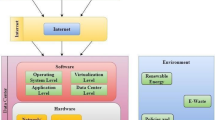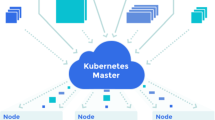Abstract
Cloud service providers offer diverse utilities to the consumer on their heterogenous requirements which may fit on different levels of performance measurements such as costs, quality of service, and accuracy, etc. Cloud is enriched with unlimited resources along with many advanced features such as scalability, robustness which increased the cloud demand in recent years. The selection of appropriate resources is a challenging task that can minimize the cost, and maximize the resource utilization and consumer experience. We have proposed the optimized kernel naive bayes cloud service selection model (OKNB) which works on the concept of maximum probability. The cloud resource bundle with maximum probability is chosen as a predicted cloud resource. Our proposed model achieves 88.76%, 88.45%, and 93.65% accuracy on response time, CPU utilization, and memory utilization models which is 3.15 and 8.04% higher than the state of the art models on response time and memory utilization models respectively. The proposed model yields 16.83 and 29.175 s lower waiting time in standard deviation and mean value compare to the GMP-SVM model.














Similar content being viewed by others
Availability of data and materials
Available on [24].
References
Garg, S. K., Versteeg, S., & Buyya, R. (2013). A framework for ranking of cloud computing services. Future Generation Computer Systems, 29(4), 1012–23.
Asghari, A., Sohrabi, M. K., & Yaghmaee, F. (2020). A cloud resource management framework for multiple online scientific workflows using cooperative reinforcement learning agents. Computer Networks, 179, 107340.
Makhlouf, R. (2020). Cloudy transaction costs: A dive into cloud computing economics. Journal of Cloud Computing, 9(1), 1.
Kumar, J., Singh, A. K., & Buyya, R. (2020). Ensemble learning based predictive framework for virtual machine resource request prediction. Neurocomputing, 397, 20–30.
Chauhan, N., Agarwal, R., Garg, K., & Choudhury, T. (2020). Redundant Iaas cloud selection with consideration of multi criteria decision analysis. In Procedia Computer Science, 167, 1325–1333.
Djiroun, R., Guessoum, M. A., Boukhalfa, K., & Benkhelifa, E. (2017). A novel cloud services recommendation system based on automatic learning techniques. In 2017 International conference on new trends in computing sciences (ICTCS) (pp. 42–49). IEEE.
Wen, Z., Shi, J., He, B., Chen, J., & Chen, Y. (2018). Efficient multi-class probabilistic SVMs on GPUs. IEEE Transactions on Knowledge and Data Engineering, 31(9), 1693–706.
Zain, T., Aslam, M., Imran, M. R., & Martinez-Enriquez, A. M. (2014). Cloud service recommender system using clustering. In 2014 11th international conference on electrical engineering, computing science and automatic control (CCE) (pp. 1–6). IEEE.
Md, A. Q., Varadarajan, V., & Mandal, K. (2019). Efficient algorithm for identification and cache based discovery of cloud services. Mobile Networks and Applications, 24(4), 1181–97.
Idrissi, A., & Abourezq, M. (2014). Skyline in cloud computing. Journal of Theoretical and Applied Information Technology, 60(3), 637–648.
Jules, O., Hafid, A., & Serhani, M. A. (2014). Bayesian network, and probabilistic ontology driven trust model for sla management of cloud services. In 2014 IEEE 3rd international conference on cloud networking (CloudNet) (pp. 77–83). IEEE.
Mohamed, A., Mai, M., & Victor, C. (2018). NMCDA: A framework for evaluating cloud computing services. Future Generation Computer Systems, 86, 12–29.
Paunović, M., Ralević, N. M., Gajović, V., Mladenović Vojinović, B., & Milutinović, O. (2018). Two-stage fuzzy logic model for cloud service supplier selection and evaluation. Mathematical Problems in Engineering. https://doi.org/10.1155/2018/7283127
Aveek, B., & Sanchitha, G. (2018). Implementing fuzzy TOPSIS in cloud type and service provider selection. Advances in Fuzzy Systems, 2018, 1–12.
Sun, L., Ma, J., Zhang, Y., Dong, H., & Hussain, F. K. (2016). Cloud-FuSeR: Fuzzy ontology and MCDM based cloud service selection. Future Generation Computer Systems., 57, 42–55.
Kontarinis, A., Kantere, V., & Koziris, N. (2016). Cloud resource allocation from the user perspective: A bare-bones reinforcement learning approach. In International conference on web information systems engineering (pp. 457–469). Springer, Cham.
Cheng, M., Li, J., & Nazarian, S. (2018). DRL-cloud: Deep reinforcement learning-based resource provisioning and task scheduling for cloud service providers. In 2018 23rd Asia and South pacific design automation conference (ASP-DAC) (pp. 129–134). IEEE.
Ye, D., Zhang, M., & Yang, Y. A. (2015). Multi-agent framework for packet routing in wireless sensor networks. Sensors, 15(5), 10026–10047.
Bega, D., Gramaglia, M., Banchs, A., Sciancalepore, V., Samdanis, K., & Costa-Perez, X. (2017). Optimising 5G infrastructure markets: The business of network slicing. In IEEE INFOCOM 2017-IEEE conference on computer communications (pp. 1–9). IEEE.
Al-faifi, A. M., Song, B., Hassan, M. M., Alamri, A., & Gumaei, A. (2018). Performance prediction model for cloud service selection from smart data. Future Generation Computer Systems, 85, 97–106.
Singh, D., & Singh, B. (2020). Investigating the impact of data normalization on classification performance. Applied Soft Computing, 97, 105524.
Shaikh, T. A., & Ali, R. (2020). An intelligent healthcare system for optimized breast cancer diagnosis using harmony search and simulated annealing (HS-SA) algorithm. Informatics in Medicine Unlocked, 21, 100408.
Rohmer, J., & Gehl, P. (2020). Sensitivity analysis of Bayesian networks to parameters of the conditional probability model using a Beta regression approach. Expert Systems with Applications, 145, 113130.
Al-Faifi, A. M., Song, B., Hassan, M. M., Alamri, A., & Gumaei, A. (2018). Data on performance prediction for cloud service selection. Data in Brief, 20, 1039–1043.
Calheiros, R. N., Ranjan, R., Beloglazov, A., De Rose, C. A. F., & Buyya, R. (2011). CloudSim: A toolkit for modeling and simulation of cloud computing environments and evaluation of resource provisioning algorithms. Software Practice and Experience, 41(1), 23–50.
Funding
The author(s) received no financial support for the research, authorship, and/or publication of this article.
Author information
Authors and Affiliations
Contributions
Naveen Chauhan: Investigation, Proposed Framework designing, Conceptualization, Writing-original draft, Result simulation, Result compilation, Validation. Rajeev Agrawal: Supervision, Conceptualization, Result compilation, Quality check.
Corresponding author
Ethics declarations
Conflict of interest
The authors declare that they have no confict of interest.
Additional information
Publisher's Note
Springer Nature remains neutral with regard to jurisdictional claims in published maps and institutional affiliations.
Rights and permissions
About this article
Cite this article
Chauhan, N., Agrawal, R. Probabilistic Optimized Kernel Naive Bayesian Cloud Resource Allocation System. Wireless Pers Commun 124, 2853–2872 (2022). https://doi.org/10.1007/s11277-022-09493-5
Accepted:
Published:
Issue Date:
DOI: https://doi.org/10.1007/s11277-022-09493-5




